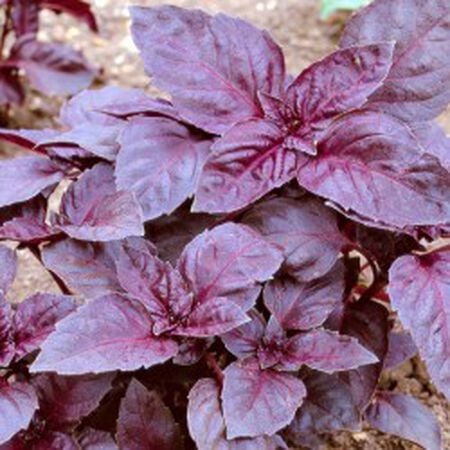Dark Opal, Basil Seeds
Key Attributes
Dark Opal basil seeds produce a striking variety of basil known for its deep purple leaves and aromatic qualities. This cultivar has roots in the Mediterranean, where basil has been treasured for centuries for its culinary and medicinal uses. Dark Opal basil's leaves are not only visually stunning but also boast a slightly spicy, clove-like flavor that enhances a wide range of dishes, from salads to pasta.
The plants typically grow 12-24 inches tall and have a bushy, compact form, making them ideal for containers and garden beds. Dark Opal basil thrives in full sun and well-drained soil, requiring regular watering to maintain its vibrant color and flavor. With a growing season of about 60-90 days, leaves can be harvested throughout the summer, with peak flavor before flowering. This variety not only serves as a delicious culinary herb but also adds ornamental beauty to gardens, attracting pollinators while deterring pests. Its unique color and robust flavor make Dark Opal basil a favorite among gardeners and chefs alike.
Key Attributes
Product Details
Weight
0.008Depth
0.1Height
4.5Width
3.25Plant Height
18-24"Botanical Name
Ocimum basilicumSeed Type
SeedAdditional Characteristics
All American SelectionSeeds Per Gram
769Seeds Per Pound
348,800Packet
100 SeedsSow Depth
1/4"Seeds Per Ounce
21,800Breed
Open-pollinatedSun
Full SunMaturity
Main SeasonGrowing Conditions
Container FriendlyLife Cycle
AnnualSow Method
TransplantDirect SowCategories
HerbGermination
11,12,13,14,8,9,10Days To Maturity (# Days)
80Components
Growing Instructions
![]() Learning Download: How to Grow Basil
Learning Download: How to Grow Basil
Herbs grow quickly and are easy to grow in pots on a porch if there is limited garden space. Basil comes in many different options with flavors from sweet to spicy.
Before Planting: Basil grows best in warm weather, and basil seeds should be planted after all dangers of frost have passed.
Planting: Plant seeds 1/4 inch deep and 12 inches apart. Seeds can be started indoors to get a head start on growing the herb. Plant indoors six weeks before the last frost date and place in a sunny windowsill. Plant in moist soil that is well-drained. If planting in a container, use a larger pot to prevent plants from drying out in the summer heat.
Watering: Water Basil frequently during dry periods.
Fertilizer: Upon planting, add organic nutrients to the soil such as compost, blood meal or cottonseed meal. Feed with liquid plant food every few weeks to encourage growth, but be sure to not use fertilizers that leave a harmful residue since you will be consuming the leaves.
Days to Maturity: Basil leaves can begin to be harvested once the plant is 6 to 8 inches tall, typically 60 to 90 days after planting the seeds.
Harvesting: Picking leaves regularly encourages more growth. Harvest the leaves by pinching them off of the stem, and always harvest from the top of the plant. Basil can be frozen to preserve its flavor, used fresh or dried.
Tips: The biggest threat to a basil plant is root rot from poor drainage, so ensure the planting site has adequate drainage. Also, watch out for pests such as aphids, slugs or Japanese beetles.
Shipping Schedule
Our Seed Promise
 "Agriculture and seeds" provide the basis upon which our lives depend. We must protect this foundation as a safe and genetically stable source for future generations. For the benefit of all farmers, gardeners and consumers who want an alternative, we pledge that we do not knowingly buy or sell genetically engineered seeds or plants.
"Agriculture and seeds" provide the basis upon which our lives depend. We must protect this foundation as a safe and genetically stable source for future generations. For the benefit of all farmers, gardeners and consumers who want an alternative, we pledge that we do not knowingly buy or sell genetically engineered seeds or plants.
The mechanical transfer of genetic material outside of natural reproductive methods and between genera, families or kingdoms, poses great biological risks as well as economic, political, and cultural threats. We feel that genetically engineered varieties have been insufficiently tested prior to public release. More research and testing is necessary to further assess the potential risks of genetically engineered seeds. Further, we wish to support agricultural progress that leads to healthier soils, to genetically diverse agricultural ecosystems, and ultimately to healthy people and communities.
To learn more about the "Safe Seed Pledge" please visit www.councilforresponsiblegenetics.org.

